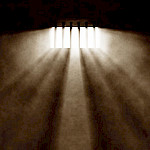Jesus Christ - God and Man (3)
He who is “the everlasting God, the Lord, the Creator of the ends of the earth, who fainteth not, neither is weary” (Isa. 40:28), is discerned on Sychar’s well, “weary” with His journeyings of love (John 4:6).
He who keepeth Israel and never slumbers, is seen peacefully sleeping amid the howlings of the storm upon the Galilean lake.
He knows all that is to come upon Him and forewarns His disciples of His suffering and death at the hands of men. Yet He knows not the day or hour appointed of the Father for His glorious coming. He upon whom worlds are dependent is Himself seen as the dependent One, saying, “I will put My trust in Him” He who commands the universe and spoke worlds into existence is under commandment of the Father and declares, “I came down from heaven not to do Mine own will, but the will of the Father which hath sent Me.”
He “sighs deeply in spirit” when a sign is sought in unbelief. He is righteously angry with the wilful opposers of His testimony. He weeps with Mary of Bethany and “groans in spirit” at the grave of Lazarus. He mourns over Jerusalem. He prays throughout His way, and at Gethsemane prays “more earnestly” when His soul is “exceeding sorrowful even unto death.” There the bitter cup which He is to drink at Calvary is in view. In His holy hatred of sin He shrinks from all that the judgment will mean, but in His perfect obedience He cries. “O My Father, if this cup may not pass away from Me except I drink it, Thy will be done.” “Though He were a Son yet learned He obedience by the things which He suffered” (Heb. 5:7-8).
Finally we contemplate Him in His holy sufferings and “death of the cross.” There He will drain to its dregs the cup of judgment from which He shrank in His holy perfection in Gethsemane’s dark garden. He feels in sacred sensitiveness of spirit all the ridicule and shame, all the insults and mockery which are heaped upon Him by those who surround the cross, even as He knows the excruciating tortures of that awful gibbet.
Then bearing our sins and “made sin for us,” He “who knew no sin” is abandoned in righteousness by God, and as all waves and billows pass over Him, and deep calls to deep, as judgment, for our sakes, falls upon Him, the cry rises from out of the darkness of that unparalleled hour, “My God, My God, why hast Thou forsaken Me?” Knowing then that all was accomplished the Victor’s cry is heard, “It is finished,” and He bows His head saying, “Father, into Thy hands I commend My spirit,” and so gives up that ghost.
He has been crucified and slain by wicked hands. And yet we know until His hour was come none could take Him. His life He lays down of Himself, and He will take it again, having authority for this also. Thus on the first day of the week we see Him rising triumphant from the dead. He raises up the temple of His body, while it remains true that “God raised Him from the dead.”
We contemplate Him now in resurrection. We hear Him “by the Holy Ghost” giving commandment, and then, on Olivet, we see Him parted from His disciples and taken up into heaven, ascending up where He was before, but now in Manhood, and taking up His seat at the right hand of the Majesty on high, “The Man Christ Jesus” still, now in the glory of God.
There we know Him as “for us;” ceaselessly interceding on our behalf—Jesus, the Mighty Son of God, succouring, sympathizing, saving to the end His loved ones while on their pilgrimage, able to feel with them in all their trials because He Himself has suffered in like manner, sin apart, during His earthly sojourn. Man knows the things of a man by the spirit of a man which is in him. Our Lord in lowly grace became a Man that He might know and sympathize and live for us on high as once He died for us at Calvary.
In all these scenes we find Him whom our souls love, manifesting the faculties and powers of full and perfect Manhood, though full and perfect Godhead is His. Both the divine nature and the human nature appear with equal distinctness, each in its own perfection and time but inseparably connected in the same glorious Person.
In Him we “behold our God.” In Him we “behold the Man.” And while we know not the fathomless mystery of His glorious Person, we know His deep, eternal love, and with glad hearts praise and adore Him.
Article series: Jesus Christ - God and Man
Jesus Christ - God and Man (2)Previous article




